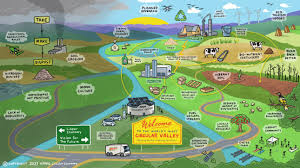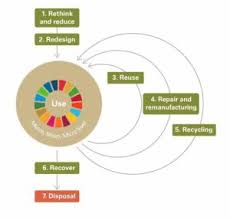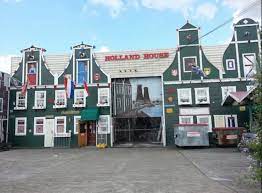
Bega aims to become Australia’s most circular economy by 2030, inspired by pioneering Dutch practices. The concept of circularity, which involves keeping materials in use at their highest value, designing out waste, and regenerating natural systems, has taken root in Bega, following the Dutch model. Circularity is described as a virtuous circle benefiting the economy, society, and the environment.
The Bega Valley Shire Council is a key participant in this initiative. The council already operates a recycling center and a weekly organic waste collection service, which diverted 1,000 tonnes of methane-producing food and garden waste from landfill last year. However, despite these efforts, 19,000 tonnes of rubbish were still sent to landfill, a figure rising faster than the population. Tim Cook, the council’s waste strategy coordinator, believes that with community support, landfill waste could be significantly reduced.

Several innovative waste reuse projects are already underway in the Bega Valley. Bega Group’s dairy factory boiler runs on wood waste, with the fly ash used as a lime replacement on pastures, saving $200,000 annually in landfill fees. A new evaporator extracts valuable milk minerals from whey waste, and wastewater irrigates hay pastures. Seaweed researcher Pia Windberg envisions using the factory’s wastewater for onshore seaweed farms, highlighting the untapped potential of this industry.
A $19-million National Centre for Circularity will soon be established in Bega, with funding from Bega Group and the New South Wales government. Kristy McBain, former mayor and current federal minister for regional development, expressed confidence in the project, given the strong community and institutional support. The initiative has garnered backing from prominent entities like Rabobank, KPMG, Deloitte, Charles Sturt University, University of Wollongong, Circular Friesland, Foodvalley Netherlands, the local council, and state and federal governments.

Drawing inspiration from the Netherlands, which aims for a fully circular economy by 2050, Bega sets ambitious targets for circularity. The Dutch experience shows that moving from a linear to a circular economy involves a fundamental shift in how resources are managed and reused. This approach promises significant economic, social, and environmental benefits, demonstrating that such a transition is both necessary and achievable.
Bega’s unique position, with one council, one airport, and just two main roads, allows for comprehensive measurement and management of circular practices. The goal is to create a model of circularity that others can emulate, fostering a broader shift towards sustainable practices across Australia.
Source: ABC News


